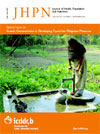
|
The Journal of Health, Population and Nutrition
icddr,b
ISSN: 1606-0997
EISSN: 1606-0997
Vol. 26, No. 4, 2008, pp. 463-467
|
 Bioline Code: hn08049
Bioline Code: hn08049
Full paper language: English
Document type: Research Article
Document available free of charge
|
|
|
The Journal of Health, Population and Nutrition, Vol. 26, No. 4, 2008, pp. 463-467
| en |
Infant-feeding Practices among HIV-infected Mothers in an HIV-treatment Programme
Sadoh, Wilson E.; Sadoh, Ayebo E.; Adeniran, Kayode A. & Abhulimhen-Iyoha, Blessing I.
Abstract
The transmission of HIV via breastmilk has led to various recommendations for HIV-infected mothers. In this study, the feeding practices of HIV-infected mothers in the first six months of their infants' lives were evaluated. In total, 103 consecutive mothers of children, aged 6-24 months, were evaluated for their feeding practices in the first six months of their infants' lives. The mothers were recruited in two cohorts based on their entry (PMTCT cohort) or non-entry (non-PMTCT cohort) to an HIV MTCT-prevention programme. Information obtained included maternal age, socioeconomic class, and the educational level attained. All the babies in the non-PMTCT cohort were breastfed compared to none in the PMTCT cohort. Infant formula was inadequately prepared for 77.42% of babies in the non-PMTCT cohort compared to 18.64% in the PMTCT cohort. The mixed-feeding rate was high (70.45 %) in the non-PMTCT cohort. Over 70% of babies in both the cohorts were bottle-fed. Voluntary counselling and testing services in the healthcare system should be strengthened. All mothers should receive infant-feeding counselling, with exclusive breastfeeding being encouraged in those with unknown HIV status.
Keywords
Antiretroviral therapy; Breastfeeding; Counselling; HIV; Infant-feeding practices; Infant food; PMTCT; Nigeria
|
| |
© Copyright 2008 - International Centre For Diarrhoeal Disease Research, Bangladesh
Alternative site location: http://www.jhpn.net
|
|
